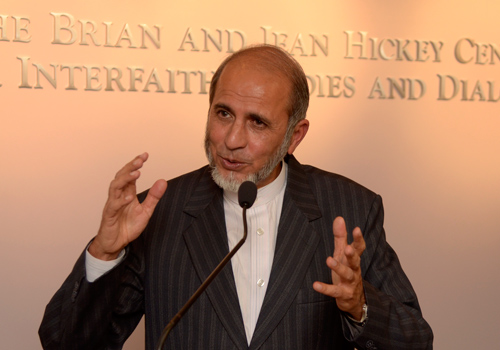 | | Dr Feryal Salem |
|
|
|
|
On January 23rd, 2015, the International Institute of Islamic Thought (IIIT) commenced its Spring 2015 Lecture Series with an insightful presentation by Dr. Feryal Salem, of Hartford Seminary. The topic of her seminar was "Reasons for Disagreements among Four Sunni Schools of Jurisprudence."....
|
|
|
|
|
 | | Prof Amna AlFaki |
On Friday January 23rd, Dr. Amna AlFaki, Professor of Pediatric & Child Health, Omdurman Islamic University - Sudan, presented a synopsis of her research on the heart as a cognitive organ and not just a pumping machine. She defined the human heart as "fundamentally a cognitive organ that processes thought, makes decisions, and interacts with the brain to produce conscious experiences". She pointed... Details
|
|
Summer Students Program - 2015
(May 18 - June 16, 2015)
Click here for details and application
|
|
1. New Modes of Belonging of Muslims in France and Europe - Paris
|
2. The Awakening of Muslim Democracy: Religion, Modernity, and the State February 10, 2015 Details... | |
3. The Muslims are Coming! Islamophobia, Extremism, and the Domestic
War on Terror
| |
4. Between Salafism and Traditionalism: The Case of Nasir al-Din al-Albani
and His Detractors
| |
5. Narratives of Emancipation in Muslim Colonial India: The Case of the
Deoband Madrasa
|
6. Muslim American Women on Campus April 2, 2015 Details... |
|
 | Dr Muhammad Shafiq
|
Muhammad Shafiq is the Executive Director of the Brian and Jean Hickey Center for Interfaith Studies and Dialogue, and is a professor of Islamic and Religious Studies at Nazareth College. He also holds the IIIT Chair in Interfaith Studies at Nazareth College.
He has written over 40 articles and several books, including: Interfaith Dialogue: A Guide For Muslims and Sacred Texts & Human Contexts: A North American Response to A Common Word between Us and You. He has led intra-faith and interfaith leadership training workshops both in North America and overseas.
Blog
|

Sacred Texts & Human Contexts:
A North American Response to A Common Word between Us and You
by: Nathan R. Kollar Muhammad Shafiq
Sacred Texts and Human Contexts describes the holy books of Judaism, Christianity, and Islam; provides multiple religious contexts for some of their common stories such as Adam and Eve and Cain and Abel; analyzes the challenges of enabling these ancient texts to be understood in today's world through the choice of proper contemporary language. It takes the bold step of re-reading the famed divisive texts of Judaism, Christianity, and Islam that are used to wage war, demand conversion, and divide humanity into the saved and the damned. It seeks the common ground among humanity by urging all to re-read three of the world's famous religious texts to find the common word between us rather than the destructive word that divides us. In the face of divisive and destructive religious pyrotechnics twenty-seven international scholars of religion affirm in this book what is common among Judaism, Christianity, and Islam; confront what is divisive among them; and deny the religious foundations for whatever causes death and destruction in our contemporary world.
|
مقالات للدكتور طه جابر العلواني
|

القيم السياسية العالمية في الخطاب القرآني: مدخل منهاجي لدراسة العلاقات الدولية مصطفى جابر العلواني |

الفنون الإسلامية
إسماعيل الفاروقي ولويس لمياء الفاروقي
|

إسماعيل الفاروقي وإسهاماته في الإصلاح الفكري الإسلامي
تحرير فتحي ملكاوي، رائد عكاشة، عبد الرحمن أبو صعيليك
| 
البناء الفكري: مفهومه ومستوياته وخرائطه فتحي ملكاوي | 
فلسفة العلم الإسلامية: مدخلاً لرؤية كونية حضارية
أحمد فؤاد باشا
| 
المفاهيم المفتاحية لنظرية المعرفة في القرآن الكريم عبد الكريم بليل |
|
A new Cataloging System was installed in the Al-Alwani & al Faruqi Libraries of the International Institute of Islamic Thought (IIIT) late last year. Searches for volumes in English and Arabic transliteration are now possible through this new system. For the catalog, click here.
For further assistance please contact the librarian:
Saber Kilany
saber@iiit.org
|
|
The International Institute of Islamic Thought (IIIT) is an intellectual forum that:
- Examines educational, academic, and societal issues from an Islamic perspective,
- Introduces intellectual and methodological reforms in education, classical knowledge, and societal science,
- Formulates a comprehensive Islamic vision and methodology for critical analysis of contemporary knowledge, and
- Promotes and supports research projects, organizes intellectual and cultural meetings, publishes scholarly works, and engages in teaching and training
|
|
|
|
|